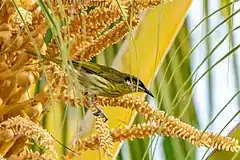Varied honeyeater
The varied honeyeater (Gavicalis versicolor) is a species of bird in the family Meliphagidae. It is found in coastal areas of New Guinea and eastern Cape York Peninsula. Its natural habitat is subtropical or tropical mangrove forests.
| Varied honeyeater | |
|---|---|
 | |
| Scientific classification | |
| Domain: | Eukaryota |
| Kingdom: | Animalia |
| Phylum: | Chordata |
| Clade: | Dinosauria |
| Class: | Aves |
| Order: | Passeriformes |
| Family: | Meliphagidae |
| Genus: | Gavicalis |
| Species: | G. versicolor |
| Binomial name | |
| Gavicalis versicolor (Gould, 1843) | |
| Synonyms | |
|
Lichenostomus versicolor | |
The varied honeyeater was previously placed in the genus Lichenostomus, but was moved to Gavicalis after molecular phylogenetic analysis, published in 2011, showed that the original genus was polyphyletic.[2][3]
Subspecies
The varied honeyeater has two accepted subspecies which are distributed as follows:[4]
G. v. sonoroides - Raja Ampat Island (northwest of New Guinea), Yapen (Geelvink Bay island, northwest New Guinea), coastal New Guinea (except southwest) through northern New Guinea and Milne Bay islands, and D'Entrecasteaux Archipelago (east of southeast New Guinea).
G. v. versicolor - coastal southern New Guinea, Torres Strait islands and northeast Cape York Peninsula, northeast Queensland (far northeast Australia).
Gallery
References
- BirdLife International (2016). "Gavicalis versicolor". IUCN Red List of Threatened Species. 2016: e.T22704055A93950328. doi:10.2305/IUCN.UK.2016-3.RLTS.T22704055A93950328.en. Retrieved 12 November 2021.
- Nyári, Á.S.; Joseph, L. (2011). "Systematic dismantlement of Lichenostomus improves the basis for understanding relationships within the honeyeaters (Meliphagidae) and historical development of Australo–Papuan bird communities". Emu. 111 (3): 202–211. doi:10.1071/mu10047. S2CID 85333285.
- Gill, Frank; Donsker, David (eds.). "Honeyeaters". World Bird List Version 6.1. International Ornithologists' Union. Retrieved 28 January 2016.
- https://observation.org/species/74962/

